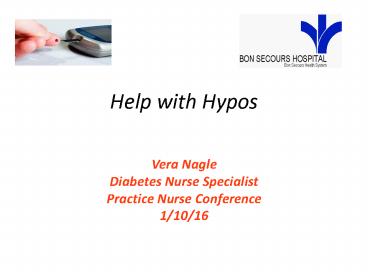Help with Hypos PowerPoint PPT Presentation
1 / 25
Title: Help with Hypos
1
Help with Hypos
- Vera Nagle
- Diabetes Nurse Specialist
- Practice Nurse Conference
- 1/10/16
2
What is Hypoglycaemia ?
- Hypoglycaemia or a hypo occurs when your blood
glucose falls too low (i.e. less than 4mmol/L). - Almost everyone with Type 1 diabetes will have a
hypo at some stage
3
Hypoglycaemia
- Hypoglycaemia is the principle limiting factor in
the management of diabetes and cause severe
disruption to the lives of people with diabetes.
4
Causes of Hypoglycaemia
- Excessive, inappropriate or ill-timed insulin
dosage, or wrong type of insulin. - People using oral glucose lowering drug therapies
incorrectly (e.g. dose or timing). - A reduction in exogenous glucose missed meals and
snacks) - A reduction in endogenous glucose production (
alcohol) - Exercise
- Tight glycaemic control
5
Causes of Hypoglycaemia
- Renal disease
- Vomiting
- Breastfeeding
- Hot weather
6
Classification of Hypoglycaemia
- Symptomatic hypoglycaemia-the episodes are
interpreted by the patient. - Asymptomatic hypoglycaemia- the person does not
recognise the episode
7
Classification of Hypoglycaemia
- Mild- Moderate Symptomatic
- The person is able to recognise and treat
mild-moderate hypoglycaemia
8
Classification of Hypoglycaemia
- Severe Hypoglycaemia
- Temporary disabling and therefore requires the
assistance of another person
9
Classification of Hypoglycaemia
- Asymptomatic Hypoglycaemia
- Detection of hypoglycaemia requires measurement
of blood glucose
10
Glucose Counter Regulation
- To maintain homeostasis and protect the brain
from prolonged glucose deprivation, hypoglycaemia
activates several autonomic and hormonal
mechanisms , which reverse the metabolic effects
of insulin
11
Symptoms
12
Consequences of Hypos
- Fear
- Being alone at night
- Anxiety while driving
- Limitations on social activities
- Upset to routine
- Loss of time
- Loss of concentration
- Cognitive Impairment
- Embarrassment( work, socially)
- Argumentative
- Injury (self other property, driving)
13
How people describe their experiences of
hypoglycaemia.
- Reference NHS Recognition, treatment and
prevention of hypoglycaemia n the community -
December 2011
14
Treatment of Hypoglycaemia
- 15 Rule
- 15grams of carbohydrate and repeat the blood
sugar in 15 minutes - If blood sugar remains less than 4.0mmol/l repeat
the oral 15grams of carbohydrate
15
What is 15g of Carbohydrate?
- 5 glucose (Dextro-Energy, Lucozade) tablets
OR - 100 ml Lucozade original OR
- 200 ml fruit juice OR fun size cans of Coke
- 150 ml sugary drink (e.g. Coke, 7UP - not the
diet version) - Take a long acting carbohydrate snack (a slice of
bread or fruit)
16
- Check your blood glucose level after 10-15
minutes - If you still don't feel well and your blood
glucose level remains less than 4.0 mmol/L,
repeat the above - Eat your next meal if due
- If your next meal is not due within an hour, have
a small snack e.g. bread, fruit - If your next meal is due, do not leave out fast
acting insulin however the dose may need to be
reduced. - Remember always carry glucose tablets or some
form of sugar with you !
17
(No Transcript)
18
Treatment of Severe Hypo
- Call 999 / 112 immediately for an ambulance
- Do not give the person anything by mouth (as you
may choke) - Place the person in the recovery position
- Inject person with glucagon
- Insulin should never be given to an unconscious
patient.
19
What is Glucagon ?
- Glucagon has the opposite effect to insulin. It
works by raising blood glucose levels temporarily
- Glucagon may take up to 15mins to work and only
lasts for a short time - When you are conscious again, you must have a
drink containing sugar to stop the hypo
20
Hypoglycaemia Unawareness
- Hypoglycaemia unawareness is used to describe
- a situation where people with diabetes, are
frequently unable to recognise a low blood sugar
or a hypo.
21
Diabetes and Driving
- For people with diabetes who drive, extra
precautions need to be taken to help maximise
road safety.
22
Education
- A fundamental element of to the avoidance of this
potentially life threatening complication of
insulin therapy is EDUCATION! - Identification by the patient of the symptoms
individual to then is crucial.
23
EDUCATION Strategies
- Try to identify possible symptoms and or
situations. - Strict home glucose monitoring
- Adjust regime approrpratiely
- Carbohydrate counting
- Exercise planning
- Carry id and hypo treatment
- Instruct relatives how to administer glycogen
- Structured Education Programmes
24
Conclusion
- Hypoglycaemia is a side effect of particular
- diabetes treatments that can have a wide reaching
- impact on a persons life.
- It is important to educate people with diabetes,
- their carers and other professionals in the early
- recognition, treatment and prevention of the
- condition in the community.
- Simple steps can be taken to prevent harm from
hypoglycaemia through prompt and effective
management of the condition.
25
(No Transcript)

